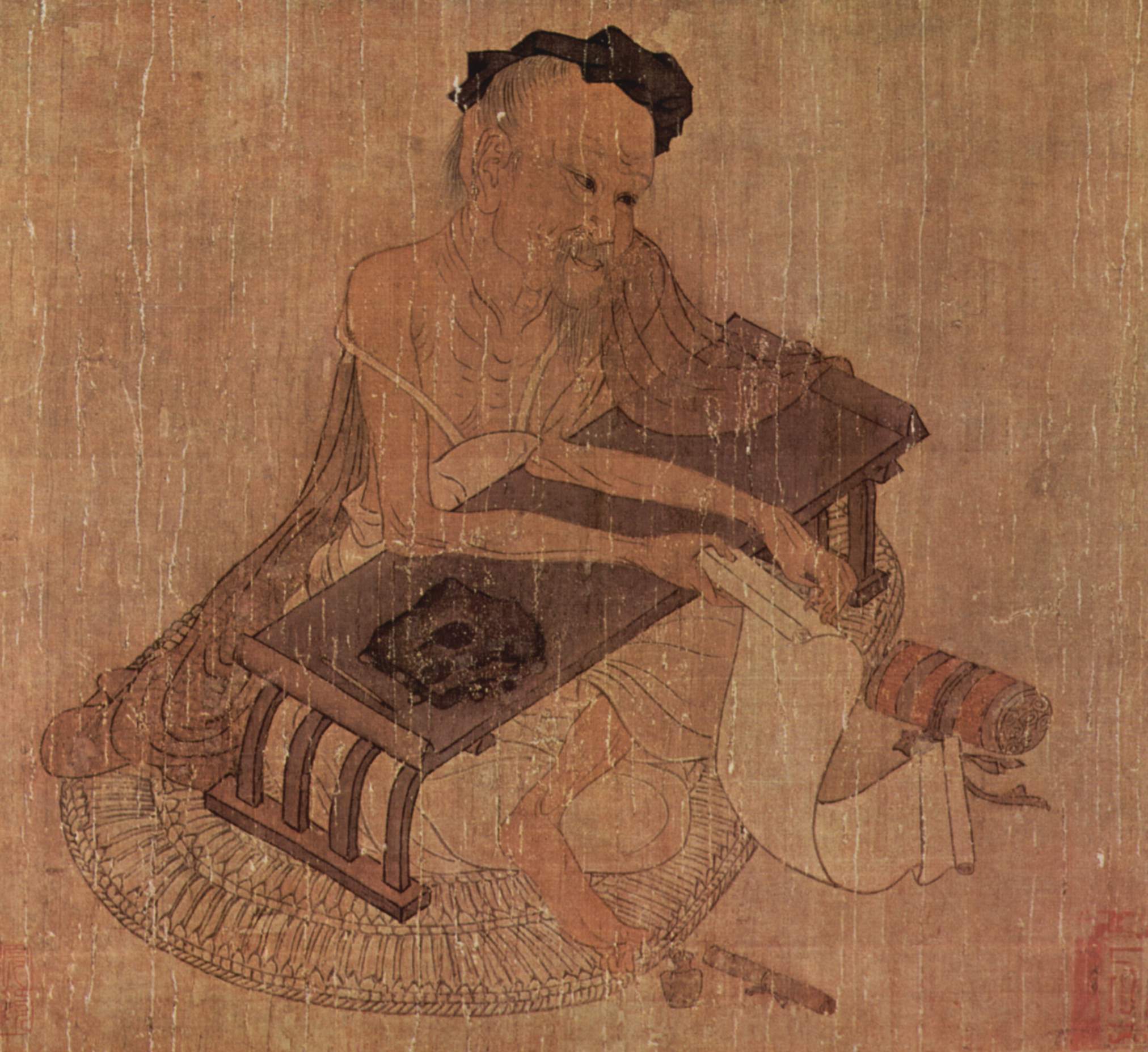- Wang Wei (8th century poet)
Infobox Writer
name = Wang Wei

caption = A portrait of Fu Sheng, allegedly painted by Wang Wei
birthdate = c. 701
birthplace =
deathdate = 761
deathplace =
occupation =Poet , Painter,Chancellor
genre =
movement =
period =
influences =
influenced =
website =Wang Wei (zh-tsp|t=王維|s=王维|p=Wáng Wéi, 701–761), sometimes titled the "Poet Buddha", was a
Tang Dynasty Chinese poet,musician , painter and statesman.From a high family, he passed the civil service entrance examination in 721 and had a successful civil service career, rising to become Chancellor in 758. During the
An Lushan Rebellion he avoided actively serving the insurgents during the capital's occupation by pretending to be deaf.He spent ten years studying with
Chán master Daoguang. After his wife's death in 730, he did not remarry and established amonastery on part of his estate.He is best known for his
quatrain s depicting quiet scenes of water and mist, with few details and little human presence. The "Indiana Companion" comments that he affirms the world's beauty, while questioning its ultimate reality. It also draws a comparison between the deceptive simplicity of his works and the "Chan" path to enlightenment, which is built on careful preparation but is achieved without conscious effort.None of his original paintings survive, but copies of works attributed to him are also landscapes with similar qualities. He influenced what became known as the Southern school of Chinese landscape art, which was characterised by strong brushstrokes contrasted with light ink washes.
Wang Wei's most famous poetry, such as the poem "Deer Park," form a group titled Wang River Collection. They record a poet's journey, ostensibly that of Wang Wei and his close friend, Pei Di. They are far more universal than a simple journey and have inspired generations of poets since, including recent adaptations such as Pain Not Bread's "Introduction to the Introduction to Wang Wei" (ISBN 1-894078-09-8), Barry Gifford's "Replies to Wang Wei" (ISBN 0-88739-441-8) and Gary Blankenship's "A River Transformed" (ISBN 1-4116-6227-X).
Eliot Weinberger andOctavio Paz 's "19 Ways of Looking at Wang Wei" (ISBN 0-918825-14-8) is an essay concerning more than 19 translations of Wang Wei's "Deer Park."One of Wang Wei's poems, called "Weicheng Qu" or "Song of the City of Wei" has been adapted to the famous music melody, "Yangguan Sandie" or "Three Refrains on the Yang Pass". The most famous version of this melody is that of the
guqin , which Wang Wei probably played.Wang-Wei's poetry, in translation, formed the inspiration for the final "Der Abschied" movement of the Austrian composer
Gustav Mahler 's penultimate completed work, "Das Lied von der Erde ".Poetry sample
:《竹里館》 "Hut in the Bamboos"
:"Sitting alone, in the hush of the
bamboo ;:I thrum myzither , and whistle lingering notes.:In the secrecy of the wood, no one can hear;:Only the clear
moon , comes to shine on me."References
*Wang Wei:Poems, translated with an introduction by G W Robinson.Penguin Books, Harmondsworth 1973
*The Poetry of Wang Wei,New translations and Commentary, Pauline Yu. Indiana University Press 1980-extensive comments ,with Chinese texts.
*Nienhauser, William H (ed.). The Indiana Companion to Traditional Chinese Literature. Indiana University Press 1986. ISBN 0-253-32983-3External links
* [http://dmoz.org/Arts/Literature/Authors/W/Wang_Wei/ Open Directory Project category]
* [http://www.poetry-chinese.com/wangwei-m.htm Regulated verses of Wang Wei, with English translation, pinyin transliteration, and tonal patterns.]
* [http://www.chinapage.com/poem/wangwei/wangwei-trs.html Translations by sixteen poets of "Deer Park"]
* [http://e-pao.net/epSubPageExtractor.asp?src=MeiteiMayek.meetei_mayek_Poems.echil-enaogi_damak_seirengma a fabulous poem of Wang Wei in Manipuri] , translated by Konthoujam SuranjitPersondata
NAME= Wei, Wang
ALTERNATIVE NAMES=Wáng Wéi; 王維 (Traditional Chinese)
SHORT DESCRIPTION= Chinesepoet , painter
DATE OF BIRTH= 701
PLACE OF BIRTH=
DATE OF DEATH= 761
PLACE OF DEATH=
Wikimedia Foundation. 2010.
